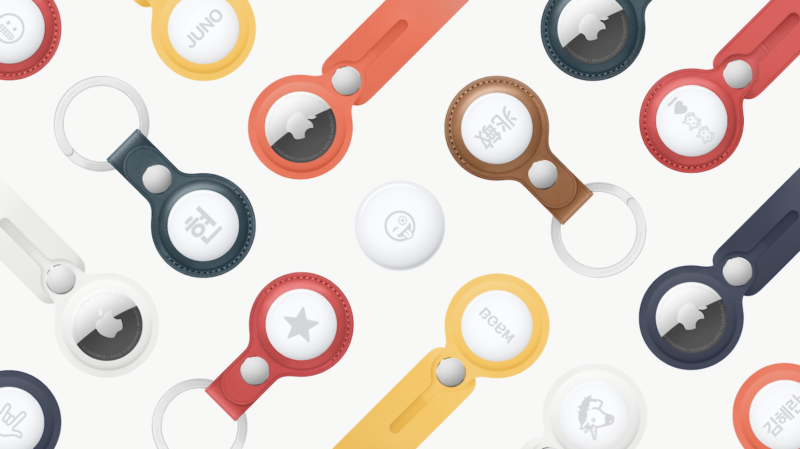
Enlarge / Apple introduced AirTags alongside several different kinds of accessories to enhance their flair and attach-ability. (credit: Apple)
Following in the footsteps of Tile, Apple, and Samsung, it sounds like Google will be the latest Big-Tech company to make a Bluetooth tracker. Android researcher Kuba Wojciechowski has spotted code for a Google first-party Bluetooth tracker codenamed—just in time for The Mandalorian season 3—"Grogu."
Wojciechowski has found references that check nearly every major box you would want in a Bluetooth tracker. It has a speaker, UWB compatibility, and supports Bluetooth LE. Wojciechowski also notes it's being built by the Nest team. If you don't want the tracker to play a ringtone to reveal its location, UWB or "Ultra Wide Band" is a radio technology that can physically locate an item. You'll need UWB to be built into your phone, but it will let you find a nearby device via a compass-like interface. UWB has been built into the Pixel 6 Pro, 7 Pro, and other high-end Android devices, though it isn't used for much.
Another interesting wrinkle is that Esper's Mishaal Rahman recently posted about a "locator tag" option landing in Google's Fast Pair developer console. Fast Pair is Google's API for quickly detecting and pairing to nearby Bluetooth devices—it shows a pop-up on the screen rather than making people dig through the settings menu. Google's Fast Pair developer console is for third-party devices, though, so seeing a "locator tag" category pop up at the same time as Grogu would be an awfully big coincidence. It suggests that Google is planning to build a Bluetooth tracker ecosystem for Grogu and let third-party hardware join the party. Why else would it add Bluetooth tracker emulation options to its public developer tools? Google handles the Fast Pair functionality for the host OS (Android), so the dev console is only for third-party Bluetooth devices.
Read 9 remaining paragraphs | Comments

Enlarge / Apple introduced AirTags alongside several different kinds of accessories to enhance their flair and attach-ability. (credit: Apple)
Following in the footsteps of Tile, Apple, and Samsung, it sounds like Google will be the latest Big-Tech company to make a Bluetooth tracker. Android researcher Kuba Wojciechowski has spotted code for a Google first-party Bluetooth tracker codenamed—just in time for The Mandalorian season 3—"Grogu."
Wojciechowski has found references that check nearly every major box you would want in a Bluetooth tracker. It has a speaker, UWB compatibility, and supports Bluetooth LE. Wojciechowski also notes it's being built by the Nest team. If you don't want the tracker to play a ringtone to reveal its location, UWB or "Ultra Wide Band" is a radio technology that can physically locate an item. You'll need UWB to be built into your phone, but it will let you find a nearby device via a compass-like interface. UWB has been built into the Pixel 6 Pro, 7 Pro, and other high-end Android devices, though it isn't used for much.
Another interesting wrinkle is that Esper's Mishaal Rahman recently posted about a "locator tag" option landing in Google's Fast Pair developer console. Fast Pair is Google's API for quickly detecting and pairing to nearby Bluetooth devices—it shows a pop-up on the screen rather than making people dig through the settings menu. Google's Fast Pair developer console is for third-party devices, though, so seeing a "locator tag" category pop up at the same time as Grogu would be an awfully big coincidence. It suggests that Google is planning to build a Bluetooth tracker ecosystem for Grogu and let third-party hardware join the party. Why else would it add Bluetooth tracker emulation options to its public developer tools? Google handles the Fast Pair functionality for the host OS (Android), so the dev console is only for third-party Bluetooth devices.
Read 9 remaining paragraphs | Comments
January 18, 2023 at 01:25AM

Post a Comment